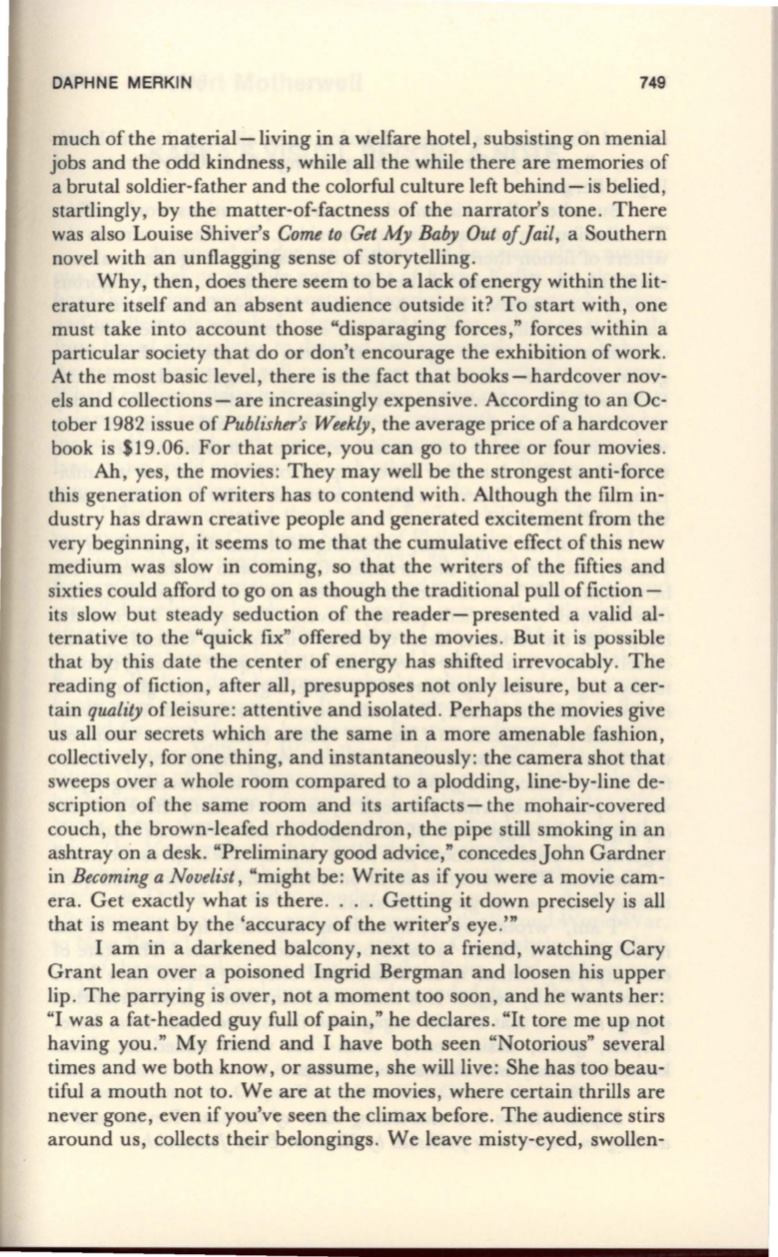
DAPHNE MERKIN
749
much of the material-living in a welfare hotel, subsisting on menial
jobs and the odd kindness , while all the while there are memories of
a brutal soldier-father and the colorful culture left behind- is belied,
startlingly, by the matter-of-factness of the narrator's tone. There
was also Louise Shiver's
Come to Get My Baby Out ofJail ,
a Southern
novel with an unflagging sense of storytelling.
Why, then , does there seem to be a lack of energy within the lit–
erature itself and an absent audience outside it? To start with , one
must take into account those "disparaging forces," forces within a
particular society that do or don't encourage the exhibition of work.
At the most basic level , there is the fact that books- hardcover nov–
els and collections- are increasingly expensive. According to an Oc–
tober 1982 issue of
Publisher's Week()!,
the average price of a hardcover
book is $19 .06 . For that price, you can go to three or four movies.
Ah , yes , the movies: They may well be the strongest anti-force
this generation of writers has to contend with. Although the film in–
dustry has drawn creative people and generated excitement from the
very beginning, it seems to me that the cumulative effect of this new
medium was slow in coming, so that the writers of the fifties and
sixties could afford to go on as though the traditional pull of fiction–
its slow but steady seduction of the reader- presented a valid al–
ternative to the "quick fix" offered by the movies. But it is possible
that by this date the center of energy has shifted irrevocably. The
reading of fiction, after all, presupposes not only leisure, but a cer–
tain
quality
of leisure : attentive and isolated . Perhaps the movies give
us all our secrets which are the same in a more amenable fashion,
collectively, for one thing, and instantaneously: the camera shot that
sweeps over a whole room compared to a plodding, line-by-line de–
scription of the same room and its artifacts- the mohair-covered
couch , the brown-leafed rhododendron, the pipe still smoking in an
ashtray on a desk. "Preliminary good advice," concedes john Gardner
in
Becoming a Novelist,
"might be: Write as if you were a movie cam–
era. Get exactly what is there .. .. Getting it down precisely is all
that is meant by the 'accuracy of the writer's eye."'
I am in a darkened balcony, next to a friend, watching Cary
Grant lean over a poisoned Ingrid Bergman and loosen his upper
lip . The parrying is over, not a moment too soon, and he wants her:
"I was a fat-headed guy full of pain," he declares. "It tore me up not
having you." My friend and I have both seen "Notorious" several
times and we both know, or assume, she will live: She has too beau–
tiful a mouth not to . We are at the movies, where certain thrills are
never gone, even if you've seen the climax before. The audience stirs
around us, collects their belongings. We leave misty-eyed, swollen-


